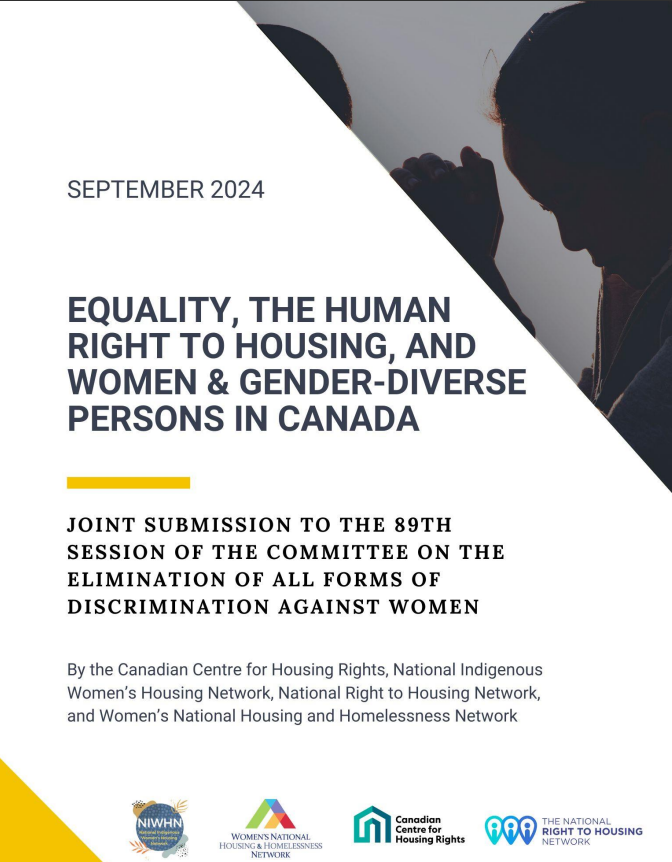The Women’s National Housing & Homelessness Network, along with partners, submitted a joint brief to the UN’s Committee on the Elimination of All Forms of Discrimination Against Women
 The Canadian Centre for Housing Rights, National Indigenous Women’s Housing Network, National Right to Housing Network, and Women’s National Housing and Homelessness Network submitted a brief in advance of the 89th Session of the UN Committee on the Elimination of All Forms of Discrimination Against Women (CEDAW).
The Canadian Centre for Housing Rights, National Indigenous Women’s Housing Network, National Right to Housing Network, and Women’s National Housing and Homelessness Network submitted a brief in advance of the 89th Session of the UN Committee on the Elimination of All Forms of Discrimination Against Women (CEDAW).
CEDAW is the body of independent experts that monitors implementation of the Convention on the Elimination of All Forms of Discrimination against Women. Adopted by the United Nations in 1979, CEDAW is the most important human rights treaty for women. The committee has 23 independent experts on women’s rights from around the world.
In 2016, CEDAW told Canada to: “ensure that the national poverty reduction strategy and the national housing strategy protect the rights of all women, with a focus on the most disadvantaged and vulnerable groups, by integrating a human rights-based and gender-based approach.”
That’s why we teamed up with our partners in a joint submission to CEDAW. Women and gender-diverse people, and particularly Indigenous women, girls, Two-Spirit, and gender-diverse people, are experiencing some of the most egregious right to housing violations across Canada.
Our submission outlines:
- The lack of coordinated action to improve the socio-economic conditions of women and gender-diverse persons (i.e., poverty, access to education, access to healthcare etc.) that impact housing security;
- The rampant human rights violations faced by Indigenous women, girls, Two-Spirit, and gender-diverse people that contribute to inadequate housing and homelessness;
- The need for federal housing programs and funding that are Indigenous-led and gender-responsive;
- The lack of adequate income supports for women and gender-diverse people and their families.
Submission Excerpt:
While recognizing the gendered violence and exploitation created as a result of housing policy failures is critical, it is also important to acknowledge that the current housing landscape does not exist in a vacuum. As recognized in Homeless on Homelands, a human rights claim submitted by the National Indigenous Women’s Housing Network:
“At the core of the matter is dispossession from lands Indigenous women, girls, and gender-diverse people have called home since time immemorial. Colonial conceptualizations of land, ownership and housing as commodities that are bought, sold and are subject to financial speculation disrupt the relationship of mutuality and reciprocity that is inherent to Indigenous relationship with land. It commodifies land and positions housing development as a tool of extracting wealth and profits. Current [housing crises and ongoing financialization of housing] in Canada deeply relies on disruption and elimination of Indigenous ways of knowing and living.”

